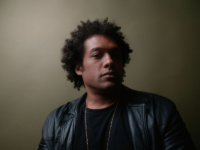Chicago native Marquis Hill brings his ace band and modern style to his Concord Jazz debut, The Way We Play. Marquis, who is now based out of New York City along with drummer extraordinaire Makaya McCraven, alto saxophonist Christopher McBride, bassist Joshua Ramos and vibraphonist Justine Thomas, seamlessly infuses modern elements in a song selection which includes some American standards. The result is an innovative, soulful and challenging collection of songs which demands repeated listening.
Marquis starts off his fourth album with a tasty and punctuated introduction, “Sirius (Welcome/Bulls Theme).” The song which includes a spoken work passage from Meagan McNeal is an all to brief homage to the Chicago Bulls. “The Way We Play/Minority” punches things into high gear with an intricate melody and pulsating bass from Ramos. Hill and saxophonist McBride rush forward in harmonic stew which leads to a delicious trumpet solo from Hill. Vibraphonist Thomas gets in on the act with pulsating solo which dances over McCraven’s drums.
“Prelude” continues the theme of bridging the songs together and flows into a cover of Horace Silver’s “Moon Rays.” McCraven kicks things off with a jaunty back beat which belies Hill’s and McBride’s interplay which is lyrical in form. Jimmy Van Heausen and Johnny Burke’s “Polka Dots and Moonbeams” is simply mesmerizing. Hill’s almost completely unaccompanied flugelhorn gently captivates the listener with its complex beauty. “Fly Little Bird Fly” picks things up, incorporating percussionist Juan Pastor and a Chicago style spoken word section from Harold Green III. The song is gently persuasive, guided by the interplay between sax and trumpet under the watchful eye and building back beat of drummer McCraven.
Herbie Hancock’s “Maiden Voyage” is given a delightful makeover. The song is slowed making it more pensive, introspective but just as effective as the original. Hall’s tone is meditatively delightful. “Straight, No Chaser” offers a nice contrast to “Maiden Voyage” as its rhythmically punchy. McBride’s sax is bopping along as it intertwines with the rhythms, then Hall steps forward to answer with an tasty contrast. Throw in an all too brief solo from drummer McCraven and the listener is very pleased with the results.
“Beep Durple” also rests on a complex rhythmic bed. The song is also enhanced by trombonist Vincent Gardner, who adds yet another hue to the albums broad pallet of colors with an effective contrast to Hill’s trumpet. Percussionist Pastor returns for “Juan’s Interlude” which leads into a rousing Afro-Cuban version of the Charlie Chaplin classic, “Smile”. Hill’s trumpet leads the race to the end, evoking visions of something familiar, thought provoking yet different than has been evoked in the countless other covers of the song.
It’s the sign of master musicians and arrangers when standards take on new life under their tutelage. Marquis Hill is the textbook definition of a master and The Way The Play relentlessly demonstrates that craft.
- Thelonious Monk – ‘Thelonious Himself’ (1957; 2025 vinyl reissue) - May 26, 2025
- Ben Tweedt – ‘Life Cycle’ (2025) - May 25, 2025
- Fernando Perdomo – ‘Waves 5’ (2025) - May 13, 2025




